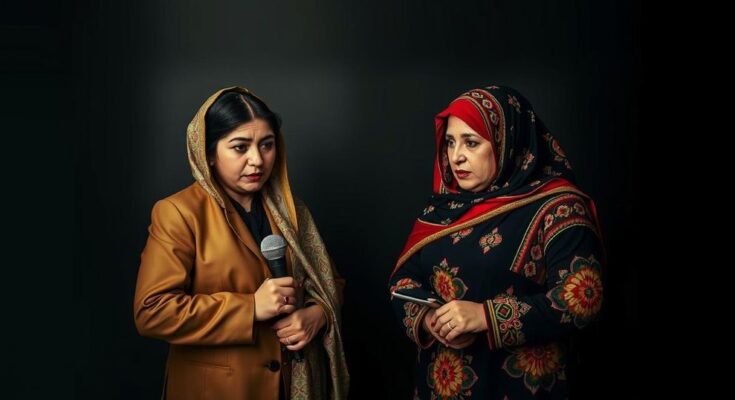The Taliban’s rule in Afghanistan has severely restricted women’s rights, leading to widespread condemnation from human rights advocates. Activists like Nazifa Jalali reveal the tragic consequences of these restrictions through real-life stories, such as a 17-year-old girl threatened with stoning for being raped. Internationally, women’s voices are excluded from peace negotiations, raising concerns about the global response to the Taliban’s actions. Activists and organizations continue to advocate for women’s rights as non-negotiable, while the international community faces pressure to act.
In the shadow of the Taliban’s resurgence in Afghanistan, the issue of women’s rights remains a critical and charged topic. The Taliban regime, shunned internationally, continues to impose strict limitations that effectively erase the rights of women and girls, drawing loud condemnation from international human rights advocates. Nazifa Jalali, an Afghan human rights activist residing in Norway, illustrates the dire situation through her efforts to assist a 17-year-old girl facing stoning after a brutal assault by her brother, a Taliban commander. Jalali reveals the grim task of rallying local leaders to negotiate for the girl’s safety, underscoring the lengths to which women must go under an oppressive regime. The international response has largely been tepid; while reports denounce the Taliban’s methodologies, tangible actions remain scarce. Since the Taliban’s return to power, more than 80 restrictive decrees have been issued, leading to a staggering decline in educational and career opportunities for women. The disheartening lack of women at the negotiating table in international forums further emphasizes the neglect of their voices. During a recent UN meeting in Doha, Afghan women were conspicuously absent, sacrificed on the altar of diplomatic negotiations, raising eyebrows and protests among human rights activists. UN officials accepted this exclusion as a means to maintain dialogue with the Taliban, despite the glaring contradiction it presents with the UN’s own principles. The discussions have revolved around economic support and combating illegal drug cultivation while dangling the carrot of potential international recognition before the Taliban. However, the giants of diplomacy have thus far ruled out recognition until substantial reforms regarding women’s rights are enacted.
The deteriorating state of women’s rights in Afghanistan under Taliban rule paints a grim picture of gender oppression and systemic injustice. Following the Taliban’s takeover, numerous decrees have stripped women of basic freedoms such as education and employment, reinforcing an environment where their rights are disregarded. The international community’s hesitance to engage robustly with the Taliban complicates the situation, as the lack of recognition leads to further isolation. High-profile activists like Nazifa Jalali highlight individual stories of suffering amid this larger geopolitical failure, urging for direct action rather than mere reports. The absence of women in peace talks exacerbates feelings of hopelessness among Afghan citizens.
The situation for women in Afghanistan demands urgent action beyond mere dialogue and reports. As the Taliban’s harsh rulings persist, the international community faces a moral imperative to act decisively and include women’s voices in negotiations. Without upholding their rights as non-negotiable, the cycle of oppression will only deepen. The hopeful narratives of activists like Jalali serve as reminders that each woman’s story is a thread in the fabric of human rights that requires protection and advocacy. Without this, Afghanistan risks sinking deeper into a dark age of gender apartheid.
Original Source: www.swissinfo.ch



